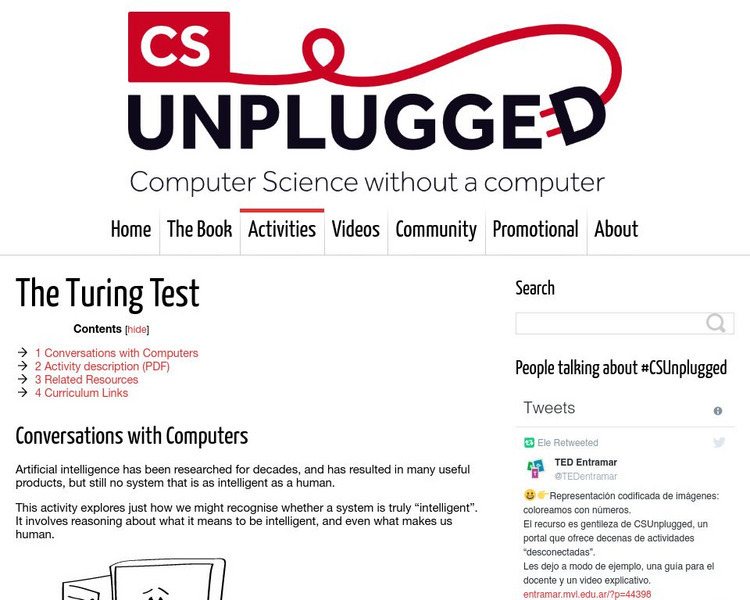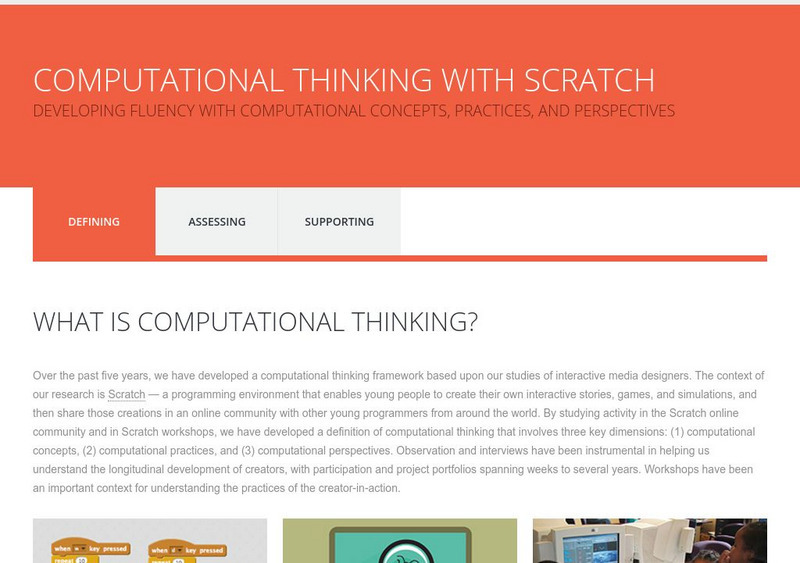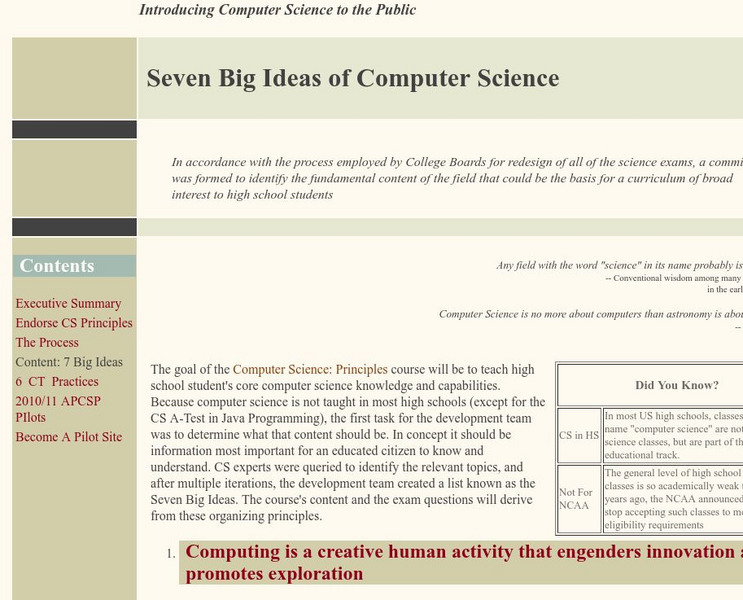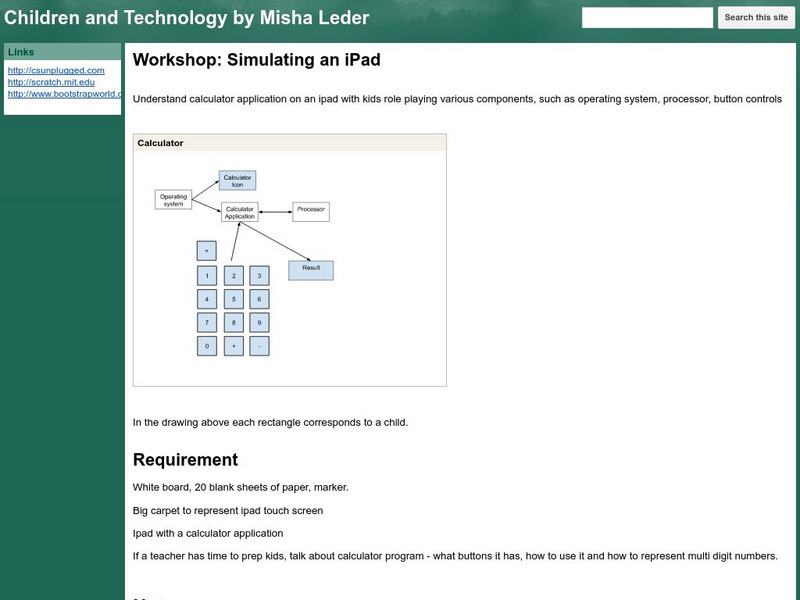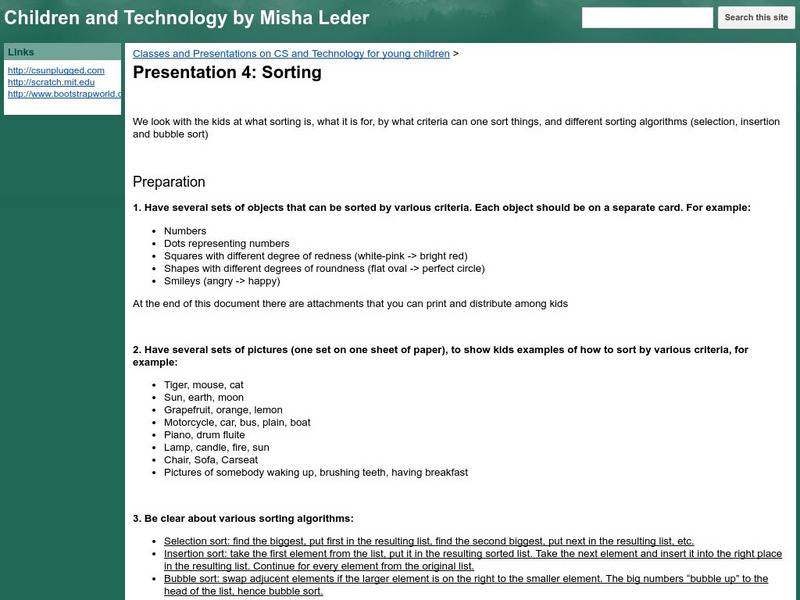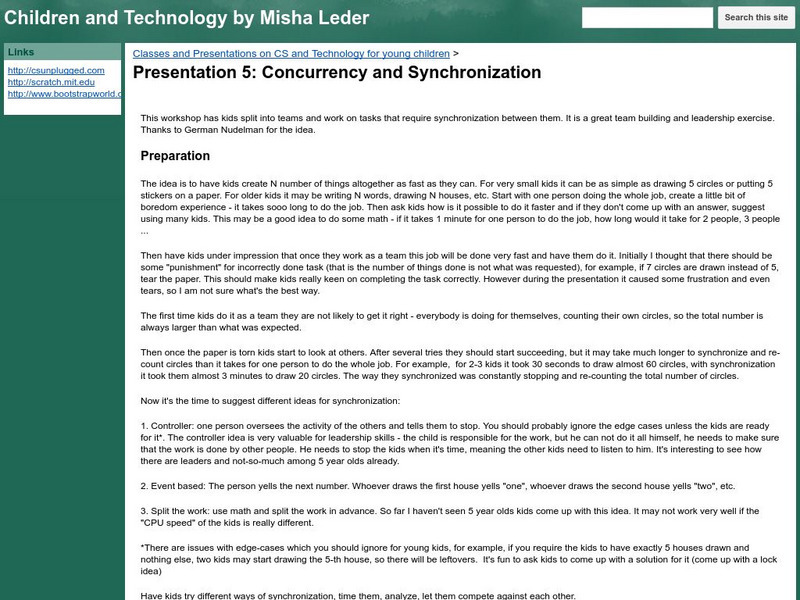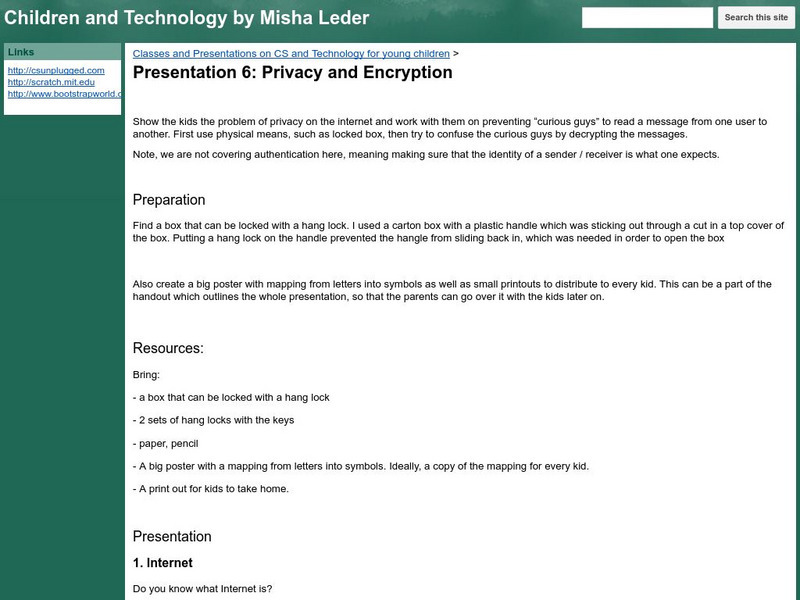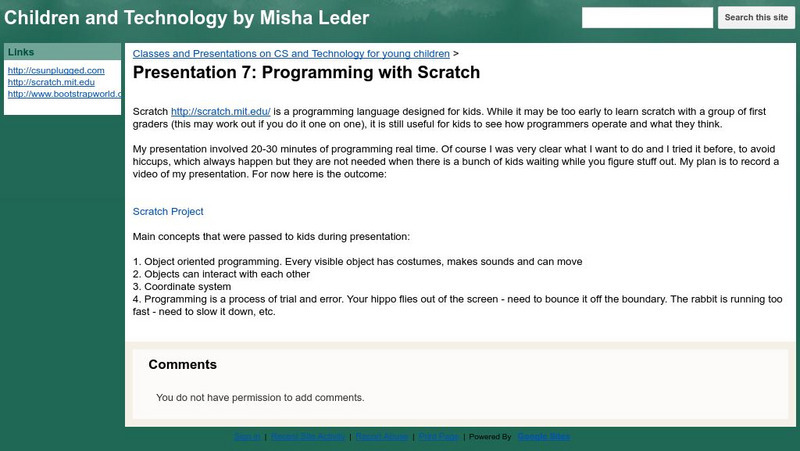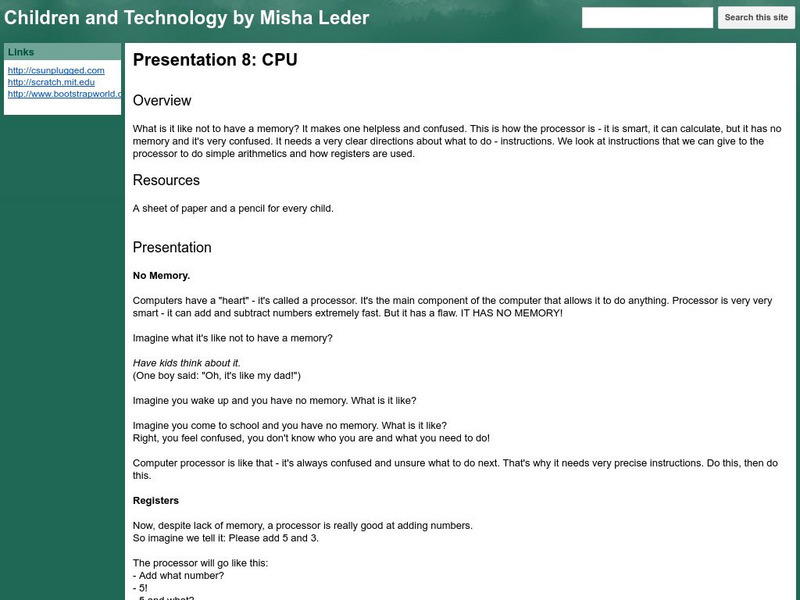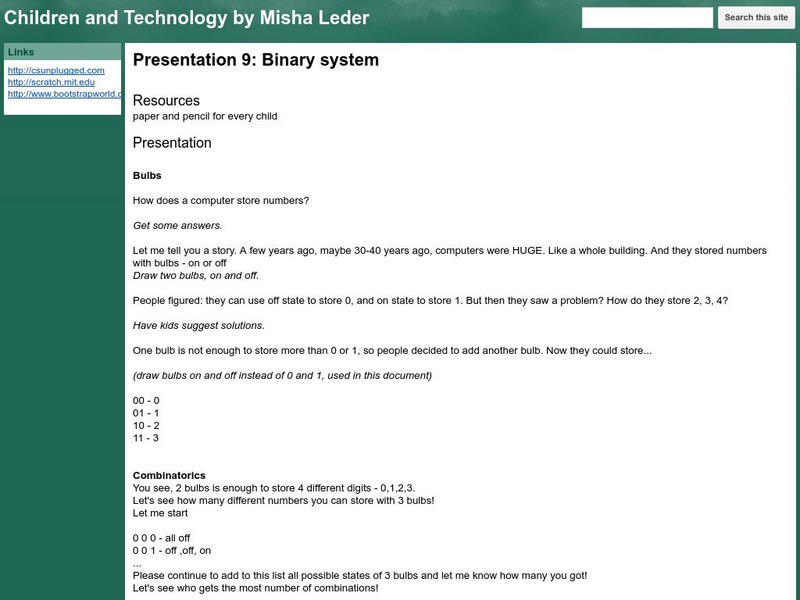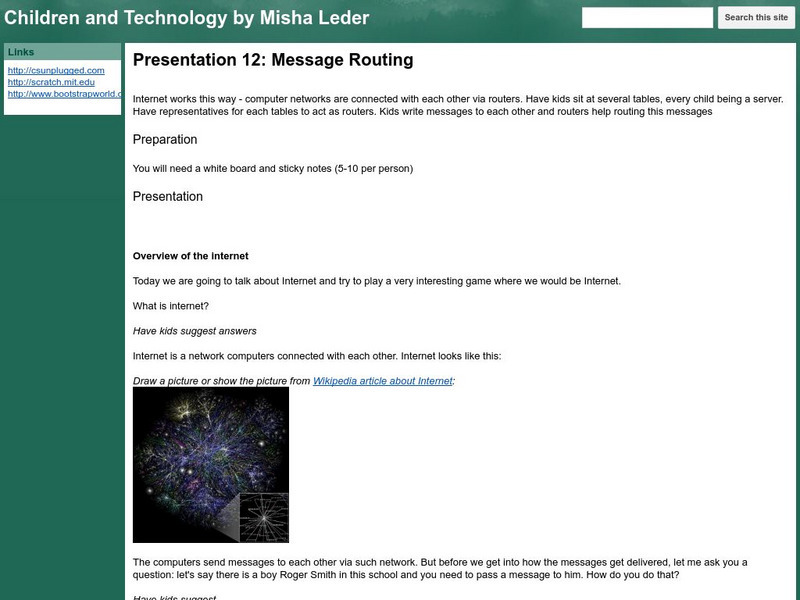Hi, what do you want to do?
University of Canterbury
University of Canterbury: Cs Unplugged: Public Key Encryption
This student activity about public key encryption allows learners to simulate encrypt and decrpyt messages without having to share a password to unlock them.
University of Canterbury
University of Canterbury: Cs Unplugged: Human Interface Design
This activity explores just how hard it is to get things right when it comes to designing good interfaces for computers.
University of Canterbury
University of Canterbury: Cs Unplugged: The Turing Test
Explore how we might recognize whether a system is truly intelligent. It involves reasoning about what it means to be intelligent, and even what makes us human.
University of Canterbury
University of Canterbury: Cs Unplugged: Community Activities
A collection of hands-on, physically-active lessons for students ages five to twelve revolving around various computer science concepts.
Google
Google for Education: Exploring Computational Thinking Lessons and Examples
Incorporate computational thinking into a curriculum with these classroom-ready lessons, examples, and programs. Lessons include complete teacher editions, student worksheets, and any applicable Python programs.
REMC Association of Michigan
Remc Association of Michigan: 21 Things4 Students: 21. Computational Thinking
Computational thinking can be used to take a complex problem, understand what the problem is and develop possible solutions to solve or explain it. In these six Quest, students will learn about the four stages of computational thinking:...
Other
Towards Data Science: Computational Thinking Defined
Computational Thinking is a set of techniques for solving complex problems that can be classified into three steps: Problem Specification, Algorithmic Expression, and Solution Implementation & Evaluation. The principles involved in...
Harvard University
Scratch Ed: Computational Thinking With Scratch: What Is Computational Thinking?
A Computational Thinking curriculum guide which develops fluency with computational concepts, practices and perspectives.
Khan Academy
Khan Academy: Computer Programming: House Class Demo
A class demo to help students visualize and learn how to program drawings using JavaScript.
University of Washington
University of Washington: Cs: Six Computational Thinking Practices
Underpinning the study of computer science are these six computational thinking practices. These practices are the kinds of activities computer scientists use.
University of Washington
University of Washington: Cs: Seven Big Ideas of Computer Science
An overview of the seven fundamental principles which make up the content of computer science.
Curated OER
Google for Education: Children and Technology: Google Earth
A demo presentation using Google Earth to fly around the world, visiting notable visitor points around the globe.
Curated OER
Google for Education: Children and Technology: Simulating a Computer
Students play the main computer components like a CPU, mouse, or IO controller to simulate calculator application by moving a mouse, synchronizing it with the mouse pointer on the screen and sending request to the processor.
Curated OER
Google for Education: Children and Technology: Simulating an I Pad
Experience being a button on a touch screen, feel the power and control of an operating system, be as smart as a processor. During this activity, students simulate a calculator application.
Curated OER
Google for Education: Children and Technology: Sorting
Students learn about data sorting, and by what criteria can one sort things by different algorithms such as selection, insertion and bubble sort.
Curated OER
Google for Education: Children and Technology: Concurrency and Synchronization
Through attempts to perform tasks in sync with each other, students experience the computer science challenges of concurrency and synchronization.
Curated OER
Google for Education: Children and Technology: Privacy and Encryption
Students simulate sending a secret message to a friend via the internet, attempting to deliver the message safely and securely.
Curated OER
Google for Education: Children and Technology: Programming in Scratch
Students experience what is it like to be computer programmers through the children's computer coding game, Scratch, developed by MIT engineers.
Curated OER
Google for Education: Children and Technology: Cpu
Introduce students to the working capability of the CPU of a computer. Look at instructions given to the processor to do simple arithmetic functions and how registers are used.
Curated OER
Google for Education: Children and Technology: Binary System
How are the numbers stored in a computer? Have students think of binary as a set of bulbs with on and off states. Take a look at how many numbers can be represented with a limited set of bulbs.
Curated OER
Google for Education: Children and Technology: Memory and Single Linked Lists
Have your students look at what memory is, in particular how a linked list can be used to represent a list of numbers. Explore linked lists in a game setting.
Curated OER
Google for Education: Children and Technology: Robots and Block Diagrams
A robot can execute very primitive commands, but it needs instructions to combine them. In this lesson, look at two types of instructions: commands and conditionals. Students split into pairs and one becomes a robot while the other one...
Curated OER
Google for Education: Children and Technology: Message Routing
Students simulate a server and are connected via computer networks. Representatives from each table act as routers, and as they write messages to each other, the routers help route these messages.
Curated OER
Google for Education: Children and Technology: Functions
Take a a look at examples of functions, and then explore functions representing arithmetic operations followed by boolean and string types. Throughout the workshop children do various assignments calculating function result or drawing a...







